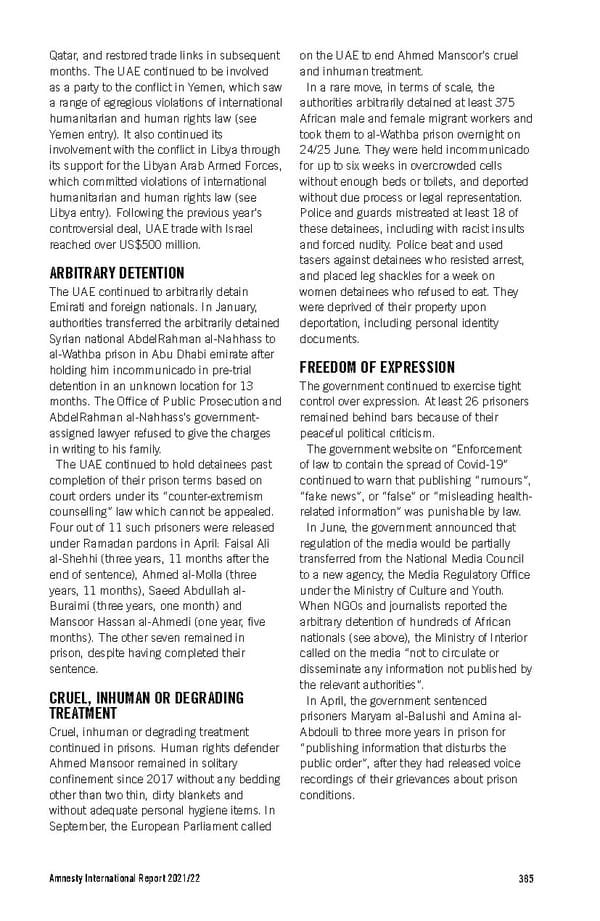Qatar, and restored trade links in subsequent on the UAE to end Ahmed Mansoor’s cruel months. The UAE continued to be involved and inhuman treatment. as a party to the conflict in Yemen, which saw In a rare move, in terms of scale, the a range of egregious violations of international authorities arbitrarily detained at least 375 humanitarian and human rights law (see African male and female migrant workers and Yemen entry). It also continued its took them to al-Wathba prison overnight on involvement with the conflict in Libya through 24/25 June. They were held incommunicado its support for the Libyan Arab Armed Forces, for up to six weeks in overcrowded cells which committed violations of international without enough beds or toilets, and deported humanitarian and human rights law (see without due process or legal representation. Libya entry). Following the previous year’s Police and guards mistreated at least 18 of controversial deal, UAE trade with Israel these detainees, including with racist insults reached over US$500 million. and forced nudity. Police beat and used ARBITRARY DETENTION tasers against detainees who resisted arrest, and placed leg shackles for a week on The UAE continued to arbitrarily detain women detainees who refused to eat. They Emirati and foreign nationals. In January, were deprived of their property upon authorities transferred the arbitrarily detained deportation, including personal identity Syrian national AbdelRahman al-Nahhass to documents. al-Wathba prison in Abu Dhabi emirate after FREEDOM OF EXPRESSION holding him incommunicado in pre-trial detention in an unknown location for 13 The government continued to exercise tight months. The Office of Public Prosecution and control over expression. At least 26 prisoners AbdelRahman al-Nahhass’s government- remained behind bars because of their assigned lawyer refused to give the charges peaceful political criticism. in writing to his family. The government website on “Enforcement The UAE continued to hold detainees past of law to contain the spread of Covid-19” completion of their prison terms based on continued to warn that publishing “rumours”, court orders under its “counter-extremism “fake news”, or “false” or “misleading health- counselling” law which cannot be appealed. related information” was punishable by law. Four out of 11 such prisoners were released In June, the government announced that under Ramadan pardons in April: Faisal Ali regulation of the media would be partially al-Shehhi (three years, 11 months after the transferred from the National Media Council end of sentence), Ahmed al-Molla (three to a new agency, the Media Regulatory Office years, 11 months), Saeed Abdullah al- under the Ministry of Culture and Youth. Buraimi (three years, one month) and When NGOs and journalists reported the Mansoor Hassan al-Ahmedi (one year, five arbitrary detention of hundreds of African months). The other seven remained in nationals (see above), the Ministry of Interior prison, despite having completed their called on the media “not to circulate or sentence. disseminate any information not published by CRUEL, INHUMAN OR DEGRADING the relevant authorities”. TREATMENT In April, the government sentenced prisoners Maryam al-Balushi and Amina al- Cruel, inhuman or degrading treatment Abdouli to three more years in prison for continued in prisons. Human rights defender “publishing information that disturbs the Ahmed Mansoor remained in solitary public order”, after they had released voice confinement since 2017 without any bedding recordings of their grievances about prison other than two thin, dirty blankets and conditions. without adequate personal hygiene items. In September, the European Parliament called Amnesty International Report 2021/22 385
 Amnesty International Report 2021/22 Page 384 Page 386
Amnesty International Report 2021/22 Page 384 Page 386